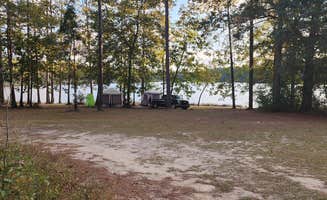Primitive camping near Ponce de Leon, Florida provides access to freshwater springs and pine forests characteristic of the northern Gulf region. The area sits at approximately 100 feet above sea level with sandy soil conditions that drain quickly after rainfall. Campers should prepare for high humidity during summer months when temperatures regularly exceed 90°F, while winter nights can occasionally drop below freezing.
What to do
Fishing opportunities: At Caryville Public Boat Ramp, campers have direct access to the Choctawhatchee River system for fishing. The boat launch provides a convenient entry point for anglers targeting bass, bream, and catfish throughout the year.
Lake activities: The waterfront at Geneva State Lake supports multiple recreational options. "Beautiful park to camp next to the lake with 2 fishing docks," notes visitor Vand H., who appreciated the proximity to water. The lake's calm surface makes it suitable for kayaking and canoeing, particularly during early morning hours.
Trail exploration: Limited hiking paths circle Geneva State Lake, though these are informal routes. "There are 2 hiking trails, more like ATV trails that go to either side of the lake from the campground," explains camper SJ W. These paths provide options for morning walks but may require sturdy footwear due to uneven terrain.
What campers like
Budget-friendly options: The affordability of dispersed camping in this region stands out. Geneva State Lake maintains minimal fees that appeal to long-term visitors. "The camping price is $2 per night, no reservation is needed, and is online payment," reports one camper, while another notes, "$5 a day and there is a QR code on the board to pay, or you can buy an annual pass for $40 if you plan on staying at least 9 days it's worth it."
Sunrise views: Early risers appreciate the morning light conditions at lakeside campsites. According to SJ W., "It was so peaceful and the sunrises over the lake were breathtaking." The eastern orientation of many shoreline sites maximizes exposure to dawn light across the water.
Relative solitude: The remote nature of these camping areas provides quiet surroundings. "Beautiful and secluded," describes one camper about Geneva State Lake, highlighting the lack of crowds typical at more developed campgrounds. Weekday visits often result in having entire sections to yourself, especially during non-summer months.
What you should know
Access challenges: Road conditions require consideration when planning trips. "It was about 5 miles of dirt roads to get in there and they were well maintained but I didn't want to risk it [in the rain]," cautions a Geneva State Lake visitor. Vehicle ground clearance becomes a factor during and after precipitation events.
Minimal facilities: Prepare for true primitive conditions at these sites. As one camper plainly states regarding Geneva State Lake, "No bathrooms just port a potty." Visitors should bring all water, sanitation supplies, and waste disposal materials needed for their stay.
Seasonal hunting activity: Surrounding forest lands often host hunting seasons that may affect camping plans. One camper observed, "You can go further into the forest but it was deer hunting season so I didn't explore." Check Florida and Alabama wildlife management calendars before planning extensive hiking around these camping areas.
Tips for camping with families
Bring entertainment: With limited developed amenities, families should pack games, nature guides, and activities. The open spaces around Geneva State Lake provide room for outdoor games, but structured entertainment depends entirely on what you bring.
Safety precautions: Water safety measures are essential when camping with children near rivers and lakes. Personal flotation devices should accompany all family members during waterfront activities, as rescue services can be distant from these remote locations.
Site selection: Choose camping spots based on terrain suitability. SJ W. notes that at Geneva State Lake, "These sites were not level," which requires careful tent placement for family comfort. Arrive early to select the flattest, most appropriate sites when camping with children.
Tips from RVers
Size limitations: Smaller vehicles fare better at these dispersed sites. One camper at Geneva State Lake mentions, "I drive a 20' van, so non-level is ok for me but these sites were not level." Larger RVs may find access and parking challenging due to uneven terrain and narrow access roads.
Self-sufficiency: RVers must bring all necessities, as no hookups exist at these locations. Plan for limited stay durations based on your vehicle's water, power, and waste storage capacities. Generator use may be restricted or discouraged in these natural settings.
Seasonal timing: Weather patterns significantly impact RV accessibility. Spring and fall offer moderate temperatures with lower humidity, making them ideal for RV camping in this region. Summer brings intense heat that tests cooling systems, while winter can produce occasional freezing temperatures.


